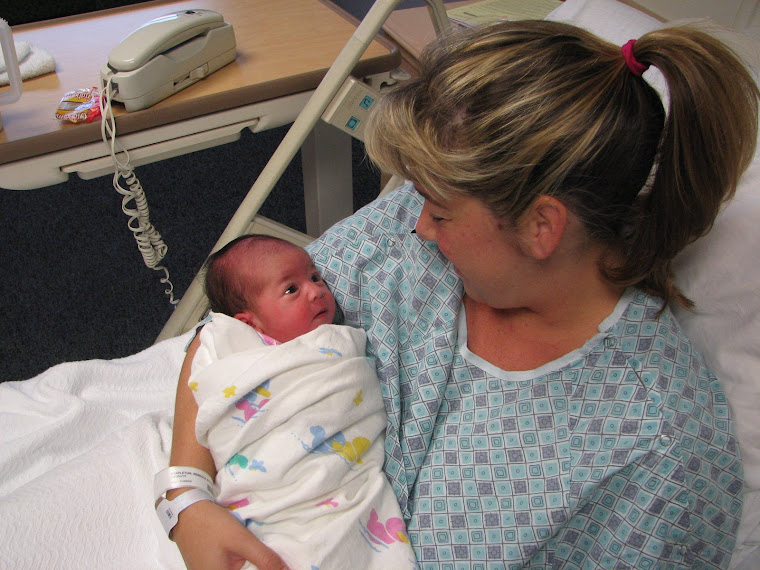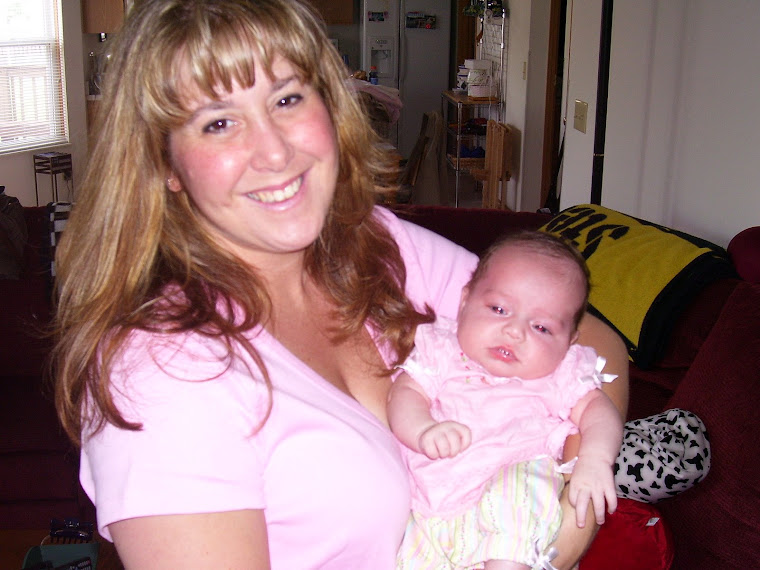I orginially read this in either Good Housekeeping or Glamour, but here is the link, it is an intersting view of it:
http://lifestyle.msn.com/relationships/articlerb.aspx?cp-documentid=14163246>1=32023
Sunday, December 14, 2008
Friday, December 12, 2008
October 15th... National Pregnancy and Infant Loss Remembrance Day

Just in case you are intersted, October 15th is National Pregnancy & Infant Loss Remebrance Day. It is far away but put it on the calendar if you would like and light a candle for your angel(s) or someone you know that has experienced a loss. You can also support this site, purchase ribbons and bracelets and even post a memorial for your angel on the Memorial Wall.
There is no activity scheduled for Columbus, Ohio in October of 2009. I am interested in setting up a walk or fundraiser during the month. Please let me know if any of you are interested and I will take it and run! (or walk :P)
Wednesday, December 10, 2008
I love this SHIRT! If I had found it when we were having issues... I WOULD HAVE WORN IT!!!
Things to do during the dreaded 2 week wait...
NO matter what stage of treatment or timing you are at, the two week wait (the wait between ovulation and possible pregnancy) SUCKS. Here are some things I thought up to do during many of mine:
* Clean out your closets
* Take classes on anything
* Voluteer for a charity
* Balance your checkbook
* Do some crafts
* GO shopping... but no where you could wonder into a baby store
* Start a journal
* Go in search of the perfect black dress
* Clean the house like spring ceaning
* Learn how to cook or bake a new dish
* Go bolwing, skiing, batting cages, putt putt (anything that you cannot do with a baby) - but check with doctor first
* Make cookies for a friend in need
* Start a great book you have been meaning to read
* Go through old pitures from high school or college
* Try to contact an old friend or acquaintence to say hello
* See if any family or friends needs help with anything... other then babysitting!
* Go buy yourself a fabulous pair of PJs and slippers
* Get a massage (if your doctor allows)
* Get your nails done or do a home mani!
* Rent a movie you have not seen in a while
* Go ice skating or rollerskating (again if allowed by doc)
* Clean out your basement, garage or attic
* Have some fun with your partner, play games, go for a walk together, learn to appreciate him/her again in a different way
And most imprtantly...dont forget to have sex!!! Seriously... once the middle of the month has passed and you are just waiting, sex can be more fun and less timed and robotic as it does during TTC. Make it interesting becuase the sex part of TTC usually is about timing and sperm counts and all that junk.... while you are in the 2 week wait, you might as wel have some fun!!!
Those are just some of my personal suggestions. I actually signed up to get my Masters while going through bigger infertility treatmennts. It was difficult because while in school, I had surgery, a messy miscarriage followed by emergerncy surgery and then actually got and stayed pregnant!!! Kaiya was born 6 days before our graduation ceremony.... so that worked out great! And I wound up with an MBA!
* Clean out your closets
* Take classes on anything
* Voluteer for a charity
* Balance your checkbook
* Do some crafts
* GO shopping... but no where you could wonder into a baby store
* Start a journal
* Go in search of the perfect black dress
* Clean the house like spring ceaning
* Learn how to cook or bake a new dish
* Go bolwing, skiing, batting cages, putt putt (anything that you cannot do with a baby) - but check with doctor first
* Make cookies for a friend in need
* Start a great book you have been meaning to read
* Go through old pitures from high school or college
* Try to contact an old friend or acquaintence to say hello
* See if any family or friends needs help with anything... other then babysitting!
* Go buy yourself a fabulous pair of PJs and slippers
* Get a massage (if your doctor allows)
* Get your nails done or do a home mani!
* Rent a movie you have not seen in a while
* Go ice skating or rollerskating (again if allowed by doc)
* Clean out your basement, garage or attic
* Have some fun with your partner, play games, go for a walk together, learn to appreciate him/her again in a different way
And most imprtantly...dont forget to have sex!!! Seriously... once the middle of the month has passed and you are just waiting, sex can be more fun and less timed and robotic as it does during TTC. Make it interesting becuase the sex part of TTC usually is about timing and sperm counts and all that junk.... while you are in the 2 week wait, you might as wel have some fun!!!
Those are just some of my personal suggestions. I actually signed up to get my Masters while going through bigger infertility treatmennts. It was difficult because while in school, I had surgery, a messy miscarriage followed by emergerncy surgery and then actually got and stayed pregnant!!! Kaiya was born 6 days before our graduation ceremony.... so that worked out great! And I wound up with an MBA!
Tuesday, December 9, 2008
Some helpful websites and message boards on Infertility
I hope some of these sites are helpful. I have found friends on certain message boards that I still communicate with long after we have had children. I highly recommned SheKnows.com because there are tons of different TTC (trying to conceive) boards for people at different stages of the process and treatments.
http://www.fertilitylifelines.com/
http://www.americanpregnancy.org/infertility/index.htm
http://www.fertilityplus.org/
http://messageboards.ivillage.com/iv-ppinfert
http://talk.sheknows.com/f2/
http://www.fertilitylifelines.com/
http://www.americanpregnancy.org/infertility/index.htm
http://www.fertilityplus.org/
http://messageboards.ivillage.com/iv-ppinfert
http://talk.sheknows.com/f2/
A good article from a Canadian newspaper about miscarriage
When Linda Layne started spotting 13 weeks into her first pregnancy, she really didn't know what to make of it. She was a healthy 30-year-old with no family history of miscarriage. She was considered low risk by the medical profession and therefore qualified for a midwife program at her local hospital.
As a result, she was completely unprepared for the loss she was about to experience.
Her midwife told her the spotting could mean nothing and to call if it got worse.
"I bled all night," she recalls. "I had horrible cramps. Finally in the morning, I called and they [the midwives] said to go to the emergency room. And they didn't go with me."
Layne's voice still rings with outrage about the lack of support the midwives offered in her time of great need.
If something had gone wrong during labour, they would have gone with her to the hospital, but since this was an early miscarriage, they just left her on her own.
"It was a horrible experience in so many different ways," she says.
Layne says her story is no different from that of millions of other women. Pregnancy loss is minimized in western society, she says -- kept secret, considered shameful, a failure of womanhood.
But it happens in 15 to 20 per cent of all pregnancies -- 50 per cent if you count right from the moment of conception. And it is devastating to many of the women who experience it, especially those who aren't mentally or physically prepared for it.
Layne subsequently experienced four more miscarriages before she adopted an infant boy, who is now 15, and gave birth to a second son prematurely at 30 weeks, who is now 13. She lost two more pregnancies after that.
A feminist anthropologist and professor at Rensselaer Polytechnic Institute in New York state, Layne spent the last 20 years looking at how pregnancy loss is handled in western society. She says feminists have dropped the ball when it comes of this common female experience.
In 2003, she published a book titled Motherhood Lost, a feminist account of pregnancy loss in America. Now she is marketing a similarly titled television series in which she interviews others on the topic and challenges doctors to better educate their patients about possible pregnancy difficulties.
Since pregnancy loss affects one in five pregnancies, she says women need to take control of it just as they have the birth experience.
"Part of what I am advocating is that it is important for people to know about pregnancy loss before it happens," she said during a recent interview in Vancouver, where she was attending a conference. "What happens is that people start to have a loss and then their caregivers tell them about it and they are already in the throes of a crisis. It's not the moment to be giving people information."
Over the last 20 years, women have reclaimed control of their babies' births -- for example, insisting on having spouses, advocates and anybody they want with them during the birth, demanding home-like birth rooms and using doulas or midwives. Women have also worked from the theory that knowledge is power and thus we see store shelves laden with pregnancy, birth and child-rearing books.
"But there is no equivalent for pregnancy loss. And it's hard," says Layne, adding that our society treats miscarriage with breathtaking insensitivity.
"Grief for a dead loved one may be both inevitable and necessary, but the additional hurt that bereaved parents feel when their losses are dismissed and diminished by others is needless and cruel."
For example, women who miscarry often find themselves awaiting surgery on a hospital ward with women giving birth. Called a D&C, or dilation and curettage, the surgery scrapes the uterus clean of fetal tissue.
"It's grossly insensitive," agrees Dr. Tim Rowe, head of the University of B.C.'s reproductive endocrinology and infertility division. "Women get a pretty raw deal. There is not a whole lot of sensitivity out there. But the health system is shrinking and everyone is thrown in together. It's a fact of life."
Layne wants to replace the hospital D&C with "home pregnancy loss," where the fetal tissue comes out on its own. Currently, most women who lose a pregnancy between the eighth and 12th week go to hospital, get a general anesthetic and a D&C.
Rowe says this is unnecessary unless there is excessive pain, bleeding or maternal distress. "In most cases, the best way is hands off, to wait and let nature take its course."
But most doctors prefer to perform a D&C to ensure the woman will not suffer a potentially dangerous uterine infection. However, the rising costs of health care are swinging the pendulum toward a more hands-off approach because, Rowe points out, it's cheaper to avoid surgery.
Layne also advocates for better information about what to expect physically during a miscarriage. Most women are simply told to expect a heavy period.
"It's not at all like a heavy period," says Layne. "That's another way of minimizing what's happening, both physically and emotionally."
Layne tested out her ideas on the obstetricians and midwives she knows and says they were horrified.
"They came up with all these rationalizations for why women should not be told about this in advance. 'Women don't want to hear, women aren't ready to hear, women are already overwhelmed. There is too much information.'
"Its so paternalistic," she says. "To withhold information from women about their bodies for those kind of reasons is pretty astounding in this day and age."
Rowe says Layne may have some valid points, but he says women react differently to pregnancy loss. "Some women find this a terrible ordeal and some don't turn a hair."
Layne suggests the trauma of pregnancy loss may be reduced by rituals centred on the woman, rather than the lost child.
Layne likes one ritual some Jewish women adapted from one for birth in which the woman who miscarries wears red threads on her wrist until her period arrives. At that point, a soothing bath is prepared for her by her female friends. A flower garland is prepared, oils added to the bath, and once she is soaking, the red threads are cut.
"It was social acknowledgement that something of significance happened, social support offered, solidarity."
That is a whole lot better than keeping pregnancies secret for the first trimester, as most women are urged to do, because it is assumed that if they miscarry, they will want that to be secret, says Layne.
THE VANCOVER SUN 2006
As a result, she was completely unprepared for the loss she was about to experience.
Her midwife told her the spotting could mean nothing and to call if it got worse.
"I bled all night," she recalls. "I had horrible cramps. Finally in the morning, I called and they [the midwives] said to go to the emergency room. And they didn't go with me."
Layne's voice still rings with outrage about the lack of support the midwives offered in her time of great need.
If something had gone wrong during labour, they would have gone with her to the hospital, but since this was an early miscarriage, they just left her on her own.
"It was a horrible experience in so many different ways," she says.
Layne says her story is no different from that of millions of other women. Pregnancy loss is minimized in western society, she says -- kept secret, considered shameful, a failure of womanhood.
But it happens in 15 to 20 per cent of all pregnancies -- 50 per cent if you count right from the moment of conception. And it is devastating to many of the women who experience it, especially those who aren't mentally or physically prepared for it.
Layne subsequently experienced four more miscarriages before she adopted an infant boy, who is now 15, and gave birth to a second son prematurely at 30 weeks, who is now 13. She lost two more pregnancies after that.
A feminist anthropologist and professor at Rensselaer Polytechnic Institute in New York state, Layne spent the last 20 years looking at how pregnancy loss is handled in western society. She says feminists have dropped the ball when it comes of this common female experience.
In 2003, she published a book titled Motherhood Lost, a feminist account of pregnancy loss in America. Now she is marketing a similarly titled television series in which she interviews others on the topic and challenges doctors to better educate their patients about possible pregnancy difficulties.
Since pregnancy loss affects one in five pregnancies, she says women need to take control of it just as they have the birth experience.
"Part of what I am advocating is that it is important for people to know about pregnancy loss before it happens," she said during a recent interview in Vancouver, where she was attending a conference. "What happens is that people start to have a loss and then their caregivers tell them about it and they are already in the throes of a crisis. It's not the moment to be giving people information."
Over the last 20 years, women have reclaimed control of their babies' births -- for example, insisting on having spouses, advocates and anybody they want with them during the birth, demanding home-like birth rooms and using doulas or midwives. Women have also worked from the theory that knowledge is power and thus we see store shelves laden with pregnancy, birth and child-rearing books.
"But there is no equivalent for pregnancy loss. And it's hard," says Layne, adding that our society treats miscarriage with breathtaking insensitivity.
"Grief for a dead loved one may be both inevitable and necessary, but the additional hurt that bereaved parents feel when their losses are dismissed and diminished by others is needless and cruel."
For example, women who miscarry often find themselves awaiting surgery on a hospital ward with women giving birth. Called a D&C, or dilation and curettage, the surgery scrapes the uterus clean of fetal tissue.
"It's grossly insensitive," agrees Dr. Tim Rowe, head of the University of B.C.'s reproductive endocrinology and infertility division. "Women get a pretty raw deal. There is not a whole lot of sensitivity out there. But the health system is shrinking and everyone is thrown in together. It's a fact of life."
Layne wants to replace the hospital D&C with "home pregnancy loss," where the fetal tissue comes out on its own. Currently, most women who lose a pregnancy between the eighth and 12th week go to hospital, get a general anesthetic and a D&C.
Rowe says this is unnecessary unless there is excessive pain, bleeding or maternal distress. "In most cases, the best way is hands off, to wait and let nature take its course."
But most doctors prefer to perform a D&C to ensure the woman will not suffer a potentially dangerous uterine infection. However, the rising costs of health care are swinging the pendulum toward a more hands-off approach because, Rowe points out, it's cheaper to avoid surgery.
Layne also advocates for better information about what to expect physically during a miscarriage. Most women are simply told to expect a heavy period.
"It's not at all like a heavy period," says Layne. "That's another way of minimizing what's happening, both physically and emotionally."
Layne tested out her ideas on the obstetricians and midwives she knows and says they were horrified.
"They came up with all these rationalizations for why women should not be told about this in advance. 'Women don't want to hear, women aren't ready to hear, women are already overwhelmed. There is too much information.'
"Its so paternalistic," she says. "To withhold information from women about their bodies for those kind of reasons is pretty astounding in this day and age."
Rowe says Layne may have some valid points, but he says women react differently to pregnancy loss. "Some women find this a terrible ordeal and some don't turn a hair."
Layne suggests the trauma of pregnancy loss may be reduced by rituals centred on the woman, rather than the lost child.
Layne likes one ritual some Jewish women adapted from one for birth in which the woman who miscarries wears red threads on her wrist until her period arrives. At that point, a soothing bath is prepared for her by her female friends. A flower garland is prepared, oils added to the bath, and once she is soaking, the red threads are cut.
"It was social acknowledgement that something of significance happened, social support offered, solidarity."
That is a whole lot better than keeping pregnancies secret for the first trimester, as most women are urged to do, because it is assumed that if they miscarry, they will want that to be secret, says Layne.
THE VANCOVER SUN 2006
Creation of this site.

My hope is that this blog will help women suffering through infertility and miscarriage and have a place for them to feel supported and not so alone. Nothing is off the table as far as discussions or questions.
Please feel free to email me also if you want to talk privately.
Welcome! Please feel free to stop by and say hello or introduce yourself.
About me: My husband Preston and I have been married for 7 years and have suffered with unexplained infertility for 4 1/2 years with 2 misscarriages in the missle in 2002 @ 8 weeks and in 2004 @ 11 weeks. We successfully got and stayed pregnant with the help of lots of medical interventions and the amazing doctors at Ohio Reproductive Medicine. We then conceived naturally less then 5 months after our first child Kaiya was born. Cassie, our second child was born with no problems. We then conceived again in May of 2008 but then lost our third baby in July 2008.
We feel our children are miracles as is every child and I always say that childrens are proof God exists.
Subscribe to:
Posts (Atom)








